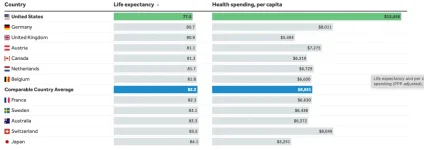- Joined
- Aug 10, 2013
- Messages
- 25,274
- Reaction score
- 32,018
- Location
- Cambridge, MA
- Gender
- Male
- Political Leaning
- Slightly Liberal
Some bipartisan alarm bells ringing this week about the ongoing financialization of health care, in which finbros' shell games sometimes seem to be crowding out the patient care mission. Concerning stuff.
Private equity reduces patient care while enriching investors, Senate report finds
Private equity reduces patient care while enriching investors, Senate report finds
A yearlong bipartisan congressional investigation into two private equity-backed U.S. hospital systems found that patient care deteriorated at both operations as their private equity owners reaped significant payouts on their investments in the systems. The findings reinforced academic research showing how private equity health care investments harm patients while enriching investors.
The investigation was helmed by two senators who lead the Senate Budget Committee — Sheldon Whitehouse, a Rhode Island Democrat, and Chuck Grassley, an Iowa Republican.
The inquiry centered on private equity giant Apollo Global Management, owner of Lifepoint Healthcare, the nation’s largest operator of rural hospitals, and Leonard Green & Partners, a private equity firm in Los Angeles that owned hospitals under the Prospect Medical Holdings umbrella from 2010 to 2021.
Over the past decade, private-equity firms like Apollo and Leonard Green have spent more than $1 trillion buying health care businesses, including hospitals, nursing homes, physician practices and hospital staffing companies. To finance these deals, private equity owners typically burden the companies they buy with debt, then slash company costs to increase earnings and appeal to potential buyers in subsequent years. Because private equity firms do not make public the financial results of the companies they own, Senate investigators aimed to assess how much profit the private equity firms generated from their investments in the hospitals and whether the deals harmed patients.
“As our investigation revealed, these financial entities are putting their own profits over patients, leading to health and safety violations, chronic understaffing, and hospital closures,” Whitehouse said in a statement. “Private equity investors have pocketed millions while driving hospitals into the ground and then selling them off, leaving towns and communities to pick up the pieces.”
Academic studies show that private equity firms’ involvement in health care is associated with significant cost increases for patients and payers, such as Medicare. A lower quality of care is also associated with private equity firms’ investments in health care. Patients receiving care at hospitals owned by private equity firms also experienced more bloodstream and surgical site infections and fell more often, a 2023 study by academics at Harvard University and the University of Chicago found.
Adding to this research, the Senate investigation found that whenever Prospect Medical facilities showed financial improvements over the period of private equity ownership, rather than investing in hospital operations to benefit patients, the owners induced the company to issue new debt, using proceeds to pay dividends to themselves.


